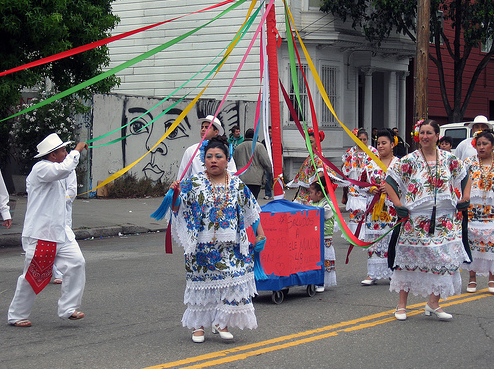A long-standing program that utilizes San Francisco hotel-tax revenue to fund the arts is facing dramatic cutbacks, and a number of cultural programs are now endangered.
 |
| Carnaval San Francisco is one of several events supported by San Francisco’s Grants for the Arts. Photo by atp_tyreseus |
The city of San Francisco uses a significant amount of money from its 14 percent hotel-room tax for Grants for the Arts, an international model for supporting cultural programs. Of that 14 percent, Grants for the Arts gets 6.4 percent.
However, occupancy rates in San Francisco hotels have dropped 10.2 percent in a year, and room rates are down –- from some $156 to $128 –- as well.
“We won’t be able to fund any new programs this coming year,” says Kary Schulman, director of Grants for the Arts. “In fact, we may have to discontinue or cut back on programs we have funded for decades.”
Last year, Grants for the Arts had $15.4 million to support arts and culture – and the same amount the year before. Much of that, about $11.5 million, funded well over 200 free performances, exhibitions, school programs and community programs.
Although final figures aren’t available, this year’s cuts will be significant. Already, six of the largest organizations funded by the program have met with representatives of Mayor Gavin Newsom. That group, including the San Francisco Ballet, Opera, Symphony, ACT, Exploratorium and Museum of Modern Art, voluntarily gave back 7.5 percent of their grant money, amounting to about $250,000.
Funding for the arts is but one part of a San Francisco budget seriously in the red – its deficit is estimated at $438 million. At the same time, arts and culture are key aspects of the San Francisco economy.
“Really all of the work we do for the arts is an investment in tourism,” Schulman says. “It makes sense for us and the economy to continue to keep the arts community in San Francisco alive.”
Promoters of the arts have a double-barrel argument. They say that the arts enrich the local culture — and that they provide economic benefits. They point to data claiming that programs funded by Grants for the Arts represent a total economy of $350,000 in salaries, goods and services.
Reduced funding from the hotel tax is hardly the only problem for arts programs. Organizational endowments are also down, some up to 40 percent. The Foundation Center, a national philanthropic information clearing house, has reported that nearly a third of the top 42 foundations they track plan to decrease grants in the coming year. It’s unlikely that the remaining two-thirds will show any sort of increase.
 |
| Room at St. Regis Hotel. Photo by terren … |
The atmosphere of cuts, says Schulman, “has a psychological effect on all of us. The finite pot of donations is shrinking.”
Schulman promises that the many arts programs aren’t going down without a fight.
“Really, all of the work we do for the arts is an investment in tourism,” says Schulman. “It makes sense for us and the economy to continue to keep the arts community in San Francisco alive.”
Grants for the Arts is continuing two programs begun in 2007: the California Cultural Data Project (www.caculturaldata.org) and the Wallace Excellence Collaboration. Both are designed for help programs bring in more funding and develop marketing and finance skills as well.
Another program of interest is a new one that was funded just this year, the San Francisco Theater. Now in its sixth year, the annual event is targeted to a multicultural audience that includes committed theatergoers as well as those just discovering the possibilities of theater. Festival performances range from 15 to 30 minutes and include Shakespeare, comedy, drama, musical theater, children’s shows, solo performances, improvisational sketches, one acts, excerpts, classics and new work.
Grants for the Arts funding provides 15 percent of its budget, says Bill Schwartz, director of the San Francisco Theater Festival, a substantial amount.
“It’s already tougher than it has been this year. We’ve just had two foundations decline to fund that have in the past,” Schwartz says. “It’s certainly more competitive out there. We’re behind on our funding at this moment and still waiting to hear from previous donors.”
The San Francisco Theater Festival is using every technique to bring in money such as teaming up with other organizations and foundations to leverage exposure online and on program materials. Schwartz also is considering a fundraising event featuring high profile actors who will donate their time.
“We’ll beg,” says Schwartz, reflecting the feelings of a number of those in cultural programs. “We’ll resend letters and ask people to reconsider if we have to.”










